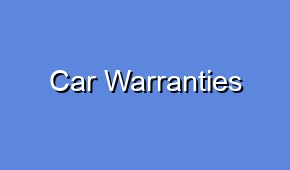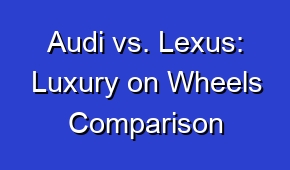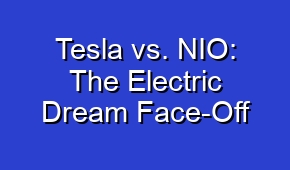Car Warranties

Car warranties provide coverage for repairs and replacements of certain car parts and systems. They offer peace of mind and financial protection for unexpected car issues.
Having a reliable car warranty is crucial for protecting your vehicle and your wallet. Car warranties provide peace of mind by covering the cost of repairs and maintenance. However, it is important to understand the different types of warranties available. Extended car warranties can be beneficial for older vehicles that may be more prone to breakdowns. Powertrain warranties specifically cover the engine, transmission, and drivetrain components. Additionally, bumper-to-bumper warranties offer comprehensive coverage for most parts of the vehicle. It is important to carefully read and understand the terms and conditions of your warranty to ensure you are fully protected. Regular maintenance and following the manufacturer’s recommended service schedule can also help keep your warranty valid.
| Car warranties provide coverage for repairs and replacements of certain car components. |
| Extended car warranties offer additional coverage beyond the manufacturer’s warranty. |
| Car warranties can help protect against unexpected repair costs. |
| Car warranties vary in terms of coverage, duration, and cost. |
| Some car warranties may include roadside assistance and rental car reimbursement. |
- It’s important to carefully read and understand the car warranty terms and conditions.
- Car warranties typically exclude regular maintenance and wear-and-tear items.
- Warranty coverage may be voided if the car is not properly maintained.
- Choosing a reputable warranty provider is crucial for reliable coverage.
- Extended car warranties can provide peace of mind for longer periods.
What is a car warranty and what does it cover?
A car warranty is a service contract that provides coverage for certain repairs and services for a specified period of time or mileage. It typically covers the cost of parts and labor for the repair or replacement of covered components.
Car warranties vary in coverage, but most commonly include protection against defects in materials or workmanship, powertrain components, and corrosion. Some warranties may also cover roadside assistance, rental car reimbursement, and other additional benefits.
What are the different types of car warranties available?
The different types of car warranties include bumper-to-bumper warranties, powertrain warranties, and extended warranties.
A bumper-to-bumper warranty, also known as a comprehensive warranty, covers almost all components of the vehicle except for wear and tear items. A powertrain warranty, on the other hand, covers the major components of the engine, transmission, and drivetrain. Extended warranties provide additional coverage beyond the standard warranty period.
How long does a car warranty typically last?
A car warranty typically lasts for a specific period of time or mileage, whichever comes first. Standard warranties range from 3 years/36,000 miles to 5 years/60,000 miles, but some manufacturers offer longer warranties.
It’s important to note that warranties may have different coverage periods for different components of the vehicle. For example, a powertrain warranty may have a longer coverage period compared to a bumper-to-bumper warranty.
Can I purchase a car warranty for a used vehicle?
Yes, it is possible to purchase a car warranty for a used vehicle. Many third-party providers offer extended warranties for used cars, providing coverage for repairs and services beyond the manufacturer’s warranty.
When considering a used car warranty, it’s important to review the terms and conditions, coverage limits, and exclusions to ensure it meets your needs. Additionally, the age, mileage, and condition of the used vehicle may affect the availability and cost of the warranty.
What is the difference between a car warranty and car insurance?
A car warranty covers the cost of repairs and services for certain components of the vehicle, while car insurance provides financial protection in case of accidents, theft, or damage to the vehicle.
While both car warranty and car insurance offer some level of protection, they serve different purposes. A car warranty focuses on mechanical breakdowns and defects, while car insurance focuses on unexpected events and liabilities.
Can I transfer my car warranty to a new owner if I sell my vehicle?
Yes, in many cases, car warranties are transferable to new owners. However, it is important to review the terms and conditions of your specific warranty to understand the transferability requirements.
Some warranties may require a transfer fee or registration with the warranty provider. Additionally, the new owner may need to meet certain eligibility criteria or provide documentation to complete the transfer process.
What is covered under a powertrain warranty?
A powertrain warranty typically covers the major components of the engine, transmission, and drivetrain.
This includes parts such as the engine block, cylinder head, transmission, torque converter, driveshaft, differential, and axle shafts. However, it’s important to review the specific terms and conditions of your powertrain warranty to understand the exact coverage.
What is the difference between a manufacturer’s warranty and an extended warranty?
A manufacturer’s warranty is provided by the vehicle manufacturer and is included with the purchase of a new car. It typically covers certain repairs and services for a specific period of time or mileage.
An extended warranty, on the other hand, is an additional service contract that can be purchased to extend the coverage beyond the manufacturer’s warranty. Extended warranties are often offered by third-party providers and may provide coverage for used vehicles as well.
What is a deductible in a car warranty?
A deductible is the amount of money that the vehicle owner is responsible for paying towards the cost of repairs covered by the warranty.
For example, if a repair costs $500 and the warranty has a $100 deductible, the owner would be responsible for paying $100 while the warranty covers the remaining $400. Deductibles can vary depending on the warranty and may apply per repair visit or per component.
Can I purchase a car warranty after the manufacturer’s warranty has expired?
Yes, it is possible to purchase an extended car warranty after the manufacturer’s warranty has expired.
Many third-party providers offer extended warranties that can be purchased at any time, providing coverage for repairs and services beyond the original warranty period. However, the availability and cost of the warranty may depend on factors such as the age, mileage, and condition of the vehicle.
What is a certified pre-owned car warranty?
A certified pre-owned car warranty is a warranty provided by the manufacturer for a used vehicle that meets specific criteria and has undergone a thorough inspection process.
These warranties often offer similar coverage to new car warranties and may include additional benefits such as roadside assistance and extended coverage periods. Certified pre-owned vehicles typically come with a limited warranty that provides peace of mind for buyers.
What is the cost of a car warranty?
The cost of a car warranty can vary depending on factors such as the make and model of the vehicle, the coverage level, the duration of the warranty, and the provider.
It’s important to obtain quotes from multiple warranty providers and compare the coverage and cost before making a decision. Additionally, be sure to review the terms and conditions, including any deductibles or exclusions that may affect the overall cost.
What is a wear and tear warranty?
A wear and tear warranty covers repairs for components that are subject to normal wear and tear during the course of vehicle use.
This can include items such as brake pads, filters, belts, hoses, and other parts that are expected to wear out over time. However, the specific coverage and limits of a wear and tear warranty can vary, so it’s important to review the terms and conditions.
What is the difference between a car warranty and a service contract?
A car warranty is typically provided by the vehicle manufacturer and is included with the purchase of a new car. It covers certain repairs and services for a specific period of time or mileage.
A service contract, on the other hand, is a separate agreement that can be purchased to provide coverage for repairs and services beyond the manufacturer’s warranty. Service contracts are often offered by third-party providers and may have different terms and conditions compared to a manufacturer’s warranty.
What is the coverage for electrical components under a car warranty?
The coverage for electrical components under a car warranty can vary depending on the specific warranty and the manufacturer.
Electrical components such as the alternator, starter motor, power windows, infotainment system, and other electrical systems may be covered under a comprehensive warranty. However, it’s important to review the terms and conditions of your warranty to understand the exact coverage and any exclusions that may apply.
Does a car warranty cover regular maintenance and routine servicing?
No, a car warranty typically does not cover regular maintenance and routine servicing, such as oil changes, tire rotations, and filter replacements.
These types of services are considered part of the vehicle’s regular maintenance schedule and are the responsibility of the vehicle owner. However, some warranties may provide additional benefits, such as discounted or complimentary maintenance services for a limited period.
What happens if I modify my vehicle under a car warranty?
Modifying your vehicle, such as installing aftermarket parts or making performance modifications, can potentially void or limit the coverage of your car warranty.
It’s important to review the terms and conditions of your warranty to understand any restrictions or limitations related to modifications. If in doubt, it’s recommended to consult with the warranty provider or authorized dealership before making any modifications to your vehicle.
What steps should I take if I need to make a warranty claim?
If you need to make a warranty claim, it’s important to follow the specific steps outlined in your warranty documentation or contact the warranty provider directly.
Typically, you will need to provide information such as the vehicle identification number (VIN), details of the issue or repair needed, and any supporting documentation. The warranty provider may have specific procedures for submitting a claim and may require the repair to be performed at an authorized dealership or service center.




















